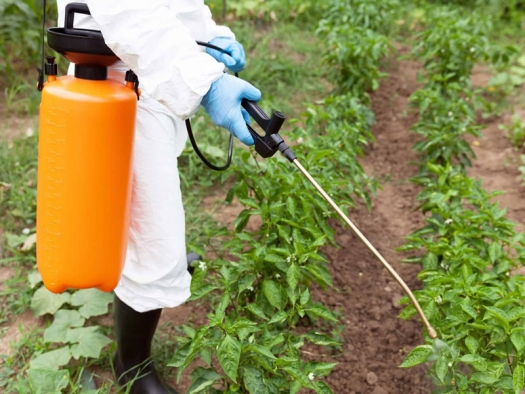ChemicalSprayGarden.jpg

Photo by macor / 123rf.com
What if I told you there was a hidden danger slowly spreading across the country and lurking in places you’d never expect? A toxic chemical so harmful that researchers across the globe are working to have it banned from use?
Sadly, the hidden danger I’m referring to isn’t made up, and this isn’t the plot of a horror movie. It’s called glyphosate – the most widely used weed killer in the world.
And while you’d never intentionally add this toxic poison to your food or water, the truth is, you’re more than likely consuming glyphosate on a daily basis. Today we’re going to dive into what glyphosate is, just how dangerous it is, and how you can actively defend yourself against its toxic effects.
What is glyphosate?
Glyphosate is what is known as a non-selective herbicide – a chemical concoction used to kill certain plants. Glyphosate is dubbed as “non-selective” because most plants will die when exposed to this herbicide. Glyphosate kills plants by disrupting what’s known as the “shikimic acid pathway” – a critical metabolic pathway that plants use to produce the enzymes and compounds they need to survive.1,2
Because glyphosate is so effective at killing plants, it’s widely used in agriculture to stop the growth and spread of invasive weeds that interfere with crop production. And while glyphosate does an excellent job of killing off pesky weeds and increasing agricultural production, it can pose some serious health risks thanks to our nearly constant exposure.
How exactly might I be exposed to glyphosate?
Glyphosate doesn’t necessarily degrade or break down. So after being used on crops, it can remain in the environment, and you can be unknowingly exposed. The main sources of glyphosate exposure include:3
- The food you eat: Glyphosate residue can remain on fresh produce and often ends up in the food products you consume.
- Drinking water: Glyphosate can runoff into water sources and end up in the water system. In fact, glyphosate is a primary water contaminant and most regions have maximum contaminant levels.
- Dust: Glyphosate and it’s metabolites can attach to soil particles and spread through erosion and wind. These dust particles can spread far and wide and unknowingly inhaled.
Glyphosate exposure is nearly impossible to avoid – so contact with this toxin is inevitable. But what effects does frequent glyphosate exposure have on our bodies and overall health?
Glyphosate as an endocrine disruptor
Glyphosate is particularly troublesome due to its ability to disrupt your body’s endocrine system. You see, glyphosate is a known endocrine disruptor, which means glyphosate can mimic or interfere with your body’s hormones and endocrine system. The endocrine system is responsible for many vital processes in the body, such as hormonal:5
- Synthesis – how your body makes hormones
- Secretion – how and when hormones are released into your body
- Transport – how your hormones get where they need to go
- Metabolism – how your body breaks down hormones
- Binding action – how hormones attach to and effect change within your body
- Elimination – how your body gets rid of hormones
Your body relies on your hormones to properly communicate and self-regulate in order for your body to function properly. So endocrine disruptors like glyphosate can have serious and even life-threatening effects over time. Let’s take a look at some of the health conditions that have been linked to glyphosate.
What are the dangers of glyphosate?
Glyphosate has been linked to a number of adverse health effects including:
- Birth defects
- Miscarriages
- Cancer
- DNA damage
- Autism
- Learning disorders
- Neurodegeneration and other cognitive disorders
- Kidney and liver damage
Glyphosate’s link to these debilitating and life-altering conditions proves that this herbicide can be harmful to a whole lot more than just weeds.
So, how can I protect myself from glyphosate?
Because glyphosate is used so extensively and can be spread through the environment, it’s impossible to avoid all exposure. But fortunately, there are some steps you can take to minimize your exposure and help your body deal with the unavoidable exposures. Here’s what I recommend:
- Focus on organic and non-GMO foods: GMO foods have been genetically engineered to be tougher and more resistant in order to increase crop production – meaning they are often doused with particularly high levels of glyphosate and other chemicals. So focus on organically grown non-GMO foods to decrease your exposure. And this isn’t exclusive to just the produce you eat. Glyphosate and other toxins can sneak their way into lots of other products too – like coffee and animal products – so try to opt for organic as often as possible.
- Minimize your toxic burden: Your body has a natural detoxification system and is designed to effectively eliminate potentially harmful toxins. But when your exposure levels get too high, toxins can begin to accumulate – overwhelming your body’s ability to detox. Taking steps to minimize your toxic burden can support your body’s natural ability to cope with the unavoidable glyphosate exposures.
- Show your gut some love: The health of your gut significantly impacts your immune system, your ability to detox, and your body’s resilience. Promote and support the health of your gut by healing any gut issues and giving yourself a daily dose of beneficial bacteria with a daily probiotic.
- Filter your water: Traces of glyphosate can hang out in tap water. Investing in a high-quality water filter like Berkey or Clearly Filtered water filters provides you with pure, great-tasting, and glyphosate-free drinking water. Ion Biome is a soil-sourced supplement that supports gut health, even damage done by glyphosate, by strengthening the junctions.
These simple steps can help your body safely deal with exposure to glyphosate and other toxins before any long-term damage is done.
When it comes to your health, you’re your own best advocate
The truth is we live in an increasingly toxic world. And exposure to chemicals like glyphosate and other environmental toxins presents a problem on a daily basis. So when it comes to protecting your health and the health of your loved ones – it requires a daily effort.
The day-to-day choices you make compound over time and are your best weapon in protecting your health and longevity. Following the steps outlined in this article and taking measures to prioritize your health can go a long way when it comes to your overall health and well-being. I’m a firm believer that your health is the best investment you’ll ever make.
References
- Glyphosate General Fact Sheet, National Pesticide Information Center
- Shikimic Acid Pathway, Science Direct
- Gillezeau, C., van Gerwen, M., Shaffer, R.M. et al. The evidence of human exposure to glyphosate: a review. Environ Health 18, 2 (2019). https://doi.org/10.1186/s12940-018-0435-5
- Glyphosate Dangers. File retrieved from United States Department of Agriculture U.S. Forest Service website.
- Fiona Young, Dao Ho, Danielle Glynn, Vicki Edwards. Endocrine disruption and cytotoxicity of Glyphosate and Roundup in human JAr cells in vitro. Integr Pharm Toxicol Genotoxicol 1: DOI: 10.15761/IPTG.1000114
Just How Dangerous Is Glyphosate? The Answer is Shocking was originally published on Dr. Jill's website, August 14, 2020. Used with permission.


